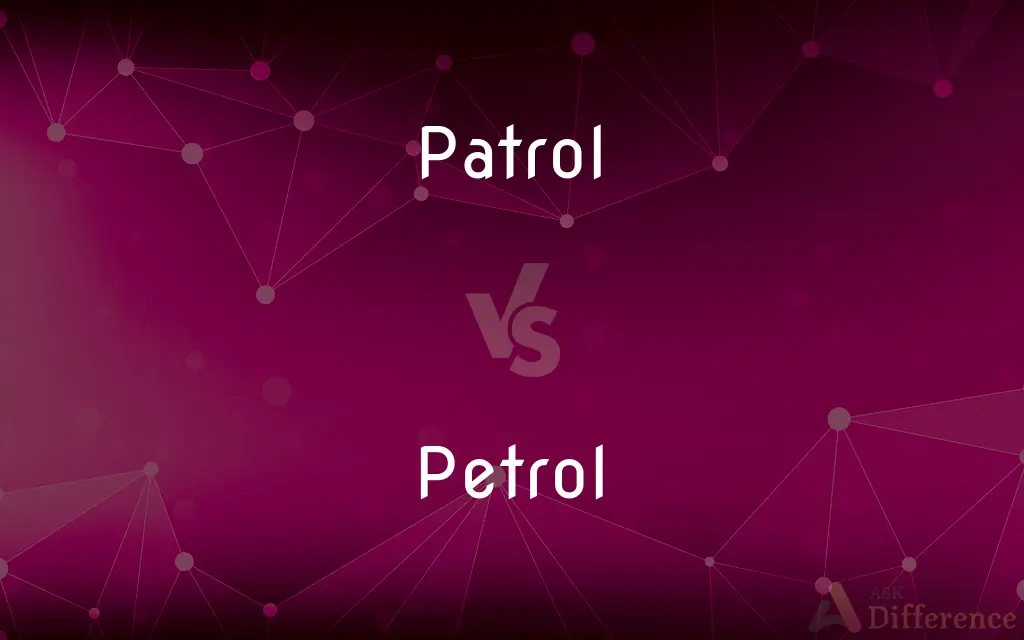Patrol vs. Petrol — What's the Difference?
By Maham Liaqat & Urooj Arif — Updated on February 24, 2024
"Patrol" refers to the act of monitoring or securing an area, often by moving through it, while "petrol" is a term for gasoline, a liquid fuel used in internal combustion engines.

Difference Between Patrol and Petrol
Table of Contents
ADVERTISEMENT
Key Differences
Patrol is a security or policing activity involving the systematic traversal of a specific area to maintain order, ensure safety, or monitor for unusual activity. This can be conducted on foot, in vehicles, or by using other means of transportation. Petrol, on the other hand, is a refined petroleum product used primarily as fuel in vehicles. It's a key energy source for most combustion engine vehicles, powering cars, motorcycles, and some small aircraft.
Patrolling serves a preventive and responsive security function, aiming to deter potential threats and respond quickly to incidents. It's a dynamic activity, requiring situational awareness and often, rapid decision-making. Petrol's role is purely functional, serving as an energy source that undergoes combustion to power engines, thereby enabling mobility and transportation.
The effectiveness of a patrol can depend on various factors including the strategy, frequency, and unpredictability of the patrols, as well as the training and skills of the personnel involved. The quality and performance of petrol, however, are determined by its octane rating and other chemical properties, which influence engine efficiency and output.
Patrols are a visible aspect of security and law enforcement efforts, contributing to public safety and order. Petrol, while essential for the functioning of modern transport systems, also has environmental implications due to carbon emissions and its role in global energy consumption.
"Patrol" and "petrol" are distinctly different in their meanings and applications, but the efficiency of patrols in modern society can sometimes be indirectly linked to the use of petrol-powered vehicles, highlighting a logistical aspect where these terms intersect in practical scenarios.
ADVERTISEMENT
Comparison Chart
Definition
The act of monitoring or securing an area.
A liquid fuel used in internal combustion engines.
Purpose
To maintain order, ensure safety, and monitor activities.
To power vehicles and engines.
Nature
Security activity, often involving movement.
Chemical substance, used as an energy source.
Evaluation
Based on strategy, effectiveness, and response.
Based on octane rating, efficiency, and environmental impact.
Context
Security, law enforcement, military.
Transportation, energy, environmental considerations.
Compare with Definitions
Patrol
Monitoring an area to prevent or respond to incidents.
The security team patrols the campus throughout the night.
Petrol
A liquid fuel for powering internal combustion engines.
She filled her car with petrol at the local station.
Patrol
A group that performs surveillance activities.
The neighborhood watch patrol reported suspicious activity.
Petrol
Refined petroleum used primarily in automobiles.
The price of petrol has risen significantly this year.
Patrol
The act of traversing an area for security purposes.
Officers patrol the streets to ensure public safety.
Petrol
A combustible hydrocarbon liquid.
The lawn mower runs on unleaded petrol.
Patrol
The assignment of moving around an area for observation.
The guard was on patrol near the main entrance.
Petrol
A key component in the transportation sector.
Global demand for petrol impacts oil markets.
Patrol
A routine or random movement through a specified area.
The ranger patrols the park to protect wildlife.
Petrol
An energy source with environmental implications.
Reducing petrol consumption can help lower carbon emissions.
Patrol
A patrol is commonly a group of personnel, such as law enforcement officers, military personnel, or private security contractors that are assigned to monitor a specific geographic area. This is also often referred to as a beat.
Petrol
A light fuel oil that is obtained by distilling petroleum and used in internal combustion engines.
Petrol fumes
Patrol
(policing) The largest division of officers within a police department or sheriff's office, whose assignment is to patrol and respond to calls for service.
Petrol
Petroleum, a fluid consisting of a mixture of refined petroleum hydrocarbons, primarily consisting of octane, commonly used as a motor fuel.
Patrol
Keep watch over (an area) by regularly walking or travelling around it
Pairs of men were patrolling on each side of the thoroughfare
The garrison had to patrol the streets to maintain order
Petrol
A shade of greenish or greyish blue.
Patrol
Any perambulation of a particular line or district to guard it; also, the men thus guarding; as, a customs patrol; a fire patrol.
In France there is an army of patrols to secure her fiscal regulations.
Petrol
Gasoline.
Patrol
Any perambulation of a particular line or district to guard it; also, the people thus guarding.
A customs patrol
A fire patrol
Petrol
(informal) A motor vehicle powered by petrol (as opposed to diesel).
Patrol
The activity of going around or through an area at regular intervals for security purposes
Petrol
Petroleum.
Patrol
A group that goes through a region at regular intervals for the purpose of security
Petrol
A volatile flammable mixture of hydrocarbons (hexane and heptane and octane etc.) derived from petroleum; used mainly as a fuel in internal-combustion engines
Common Curiosities
How often do patrols typically occur?
The frequency varies based on the area's security needs and the patrolling strategy.
Can patrols be conducted without vehicles?
Yes, patrols can be on foot, bicycle, horseback, or using other means.
What is the main function of a patrol?
To maintain safety, order, and security through monitoring and presence.
Is petrol the only type of fuel for vehicles?
No, vehicles can also use diesel, electricity, natural gas, and other alternative fuels.
What are the environmental concerns associated with petrol?
Petrol combustion releases CO2, contributing to greenhouse gas emissions and climate change.
How does petrol power an engine?
Petrol combusts in an engine's cylinders, creating the energy needed to power the vehicle.
What factors influence patrol effectiveness?
Factors include patrol strategy, frequency, training of personnel, and community engagement.
What is the octane rating in petrol?
It measures the fuel's resistance to knocking or pinging during combustion, affecting engine performance.
How do patrols impact community safety?
Visible patrols can deter crime and provide a sense of security, aiding in rapid response to incidents.
How is petrol refined?
Petrol is produced from crude oil through a refining process that includes distillation and treatment.
Can patrols use alternative energy vehicles?
Yes, patrols can use electric or hybrid vehicles to reduce reliance on petrol.
What role does petrol play in global energy consumption?
Petrol is a significant part of the world's energy use, primarily in transportation.
Are there different types of petrol?
Yes, including unleaded, premium, and various octane levels tailored to engine specifications.
What are the alternatives to petrol for reducing environmental impact?
Alternatives include electric vehicles, biofuels, hydrogen fuel cells, and public transportation.
Can technological advancements improve patrol efficiency?
Yes, advancements in communication, surveillance, and vehicle technology enhance patrol capabilities.
Share Your Discovery

Previous Comparison
Destiny vs. Luck
Next Comparison
Manufacture vs. FabricateAuthor Spotlight
Written by
Maham LiaqatCo-written by
Urooj ArifUrooj is a skilled content writer at Ask Difference, known for her exceptional ability to simplify complex topics into engaging and informative content. With a passion for research and a flair for clear, concise writing, she consistently delivers articles that resonate with our diverse audience.
















































